If you’ve ever dealt with the pain and hassle of heartburn, you know how important it is to find relief. Acid reflux and its serious form, GERD, can really mess with our stomach health. This leads to symptoms that make everyday life tough. But, with the right info and steps, we can manage our heartburn and feel better.
This guide will show you how to ease heartburn by avoiding certain foods. By knowing which foods trigger acid reflux and choosing better options, you can improve your stomach health. This means less discomfort from heartburn.
Key Takeaways
- Heartburn and acid reflux happen when stomach acid flows back up into the esophagus.
- Some foods and drinks can make heartburn worse, like acidic, high-fat, and spicy ones.
- Staying away from these foods and picking better ones can really help.
- Changing your lifestyle, like eating smaller meals and keeping a healthy weight, can also ease heartburn.
- Sometimes, you might need medicine like antacids or proton pump inhibitors for ongoing heartburn or GERD.
Understanding Heartburn and Acid Reflux
Heartburn and acid reflux happen when stomach acid goes back into the esophagus. This causes a burning feeling in the chest and throat. These problems can really affect your digestive health and might lead to worse conditions if not treated.
Causes and Symptoms
A weak or not working right lower esophageal sphincter (LES) is the main cause. The LES is the muscle between the stomach and esophagus. If it doesn’t close right, stomach acid can move up, causing the burning feeling of heartburn and acid reflux. You might notice:
- Burning sensation in the chest or throat
- Difficulty swallowing
- Regurgitation of food or sour liquid
- Feeling of a lump in the throat
The Impact on Digestive Health
Not controlling acid reflux can harm your digestive health over time. Too much stomach acid can hurt the esophagus’s lining, causing gastroesophageal reflux disease (GERD). GERD can greatly increase the risk of esophageal cancer, a serious and possibly deadly condition. Keeping your digestive system healthy is key to avoiding these issues.

Common Heartburn Trigger Foods
For those dealing with heartburn and acid reflux, knowing which foods and drinks can make things worse is key. Foods high in acid and drinks with caffeine or alcohol are often to blame.
Acidic Foods and Beverages
Citrus fruits like oranges, grapefruits, and lemons are big troublemakers. They make more stomach acid, causing a burning feeling in the chest and throat.
Tomatoes and things made with them, like sauces and ketchup, also cause heartburn. Their acidity can make the lower esophageal sphincter (LES) relax. This lets stomach acid go back up into the esophagus.
| Acidic Foods | Acidic Beverages |
|---|---|
| Citrus fruits (oranges, grapefruits, lemons) | Coffee |
| Tomatoes and tomato-based products | Tea |
| Vinegar-based condiments | Alcohol |
Not just acidic foods, but caffeinated drinks like coffee and tea, and alcoholic drinks too, can cause heartburn. They relax the LES and make more stomach acid.

By watching out for these heartburn trigger foods, people can help manage their symptoms. This can bring relief from acid reflux discomfort.
Foods High in Fat and Spices
Acidic foods can cause heartburn, but so can high-fat and spicy foods. These foods can relax the muscle that keeps stomach acid from flowing back up. This leads to more acid reflux.
Foods like fried and fatty meats, like burgers and sausages, are bad for heartburn. They have a lot of fat that slows down digestion. This lets stomach acid back up into the esophagus. Creamy sauces and dressings, like Alfredo or ranch, can also make heartburn worse.
Spicy foods, like chili peppers and curry, can make heartburn even worse. The capsaicin in these foods can irritate the esophagus. This causes a burning feeling and more acid production.
- Fried and fatty meats, like burgers and sausages, can relax the LES and delay stomach emptying, contributing to acid reflux.
- Creamy sauces and dressings, such as Alfredo and ranch, are also high-fat heartburn triggers.
- Spicy foods, including chili peppers, curry, and salsa, can irritate the esophageal lining and increase acid production.
| Food Item | Potential Heartburn Impact |
|---|---|
| Fried foods | High in fat, can relax the LES and delay stomach emptying |
| Fatty meats | High in fat, can relax the LES and delay stomach emptying |
| Creamy sauces | High in fat, can relax the LES and delay stomach emptying |
| Spicy foods | Can irritate the esophageal lining and increase acid production |
By watching what you eat, you can help manage acid reflux. Knowing which foods trigger heartburn can make a big difference in your health.
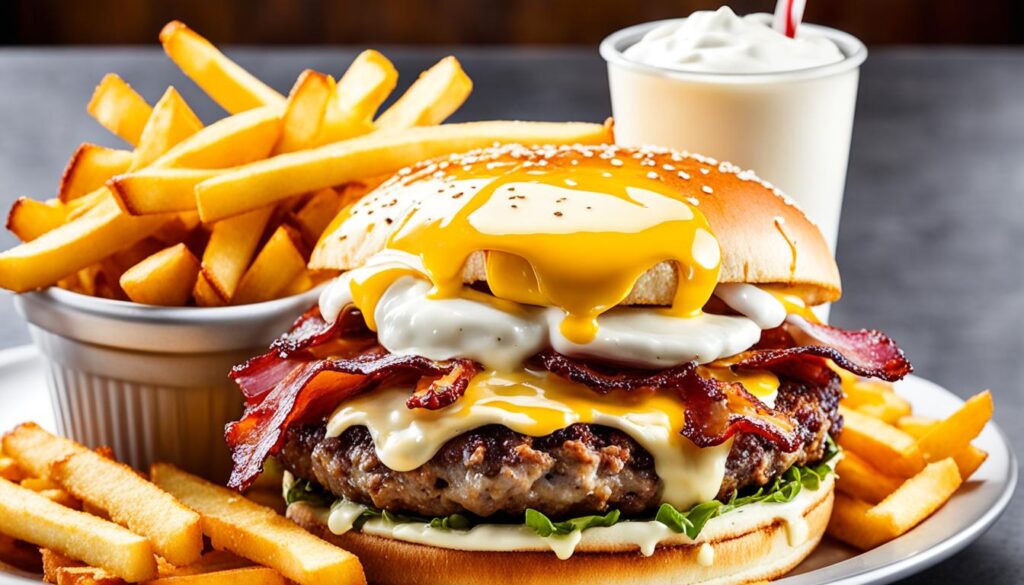
Caffeinated Drinks and Alcohol
Caffeine and alcohol are big troublemakers for heartburn. They can really mess with your digestion, making heartburn worse.
Exacerbating Factors
Caffeine is in coffee, tea, and many sodas. It relaxes the valve between the stomach and esophagus. This lets stomach acid flow back up, causing heartburn.
Caffeine also slows down the stomach from emptying. This makes reflux even worse.
Alcohol does the same thing to the valve, letting acid back up. It also irritates the esophagus, making heartburn and acid reflux worse. Plus, it slows digestion, keeping stomach acids around longer.
To avoid heartburn, cut down or skip caffeinated drinks and alcohol, especially before bed. That’s when reflux is usually the worst.

| Substance | Effect on Heartburn |
|---|---|
| Caffeine | Relaxes the LES, delays stomach emptying |
| Alcohol | Relaxes the LES, irritates the esophagus, delays stomach emptying |
Heartburn Relief: Foods to Avoid
If you’re dealing with acid reflux or GERD, finding heartburn relief is key. Start by knowing which foods to avoid. This can help you manage your condition and ease the discomfort.
Some foods and drinks can make acid reflux worse and cause heartburn. Foods high in acid, like citrus fruits, tomatoes, and vinegar-based dressings, are at the top of the list. These can irritate your esophagus, leading to heartburn.
- Citrus fruits (oranges, grapefruits, lemons, limes)
- Tomatoes and tomato-based products (sauces, salsa, ketchup)
- Vinegar and vinegar-based condiments
High-fat and spicy foods are also bad news for GERD patients. They can relax the muscle that keeps stomach acid down, leading to heartburn.
- Fried and fatty foods (french fries, chips, fatty meats)
- Spicy dishes (chili, curry, hot sauce)
Caffeine and alcohol can also make acid reflux worse. People with heartburn should try to limit or avoid these drinks.
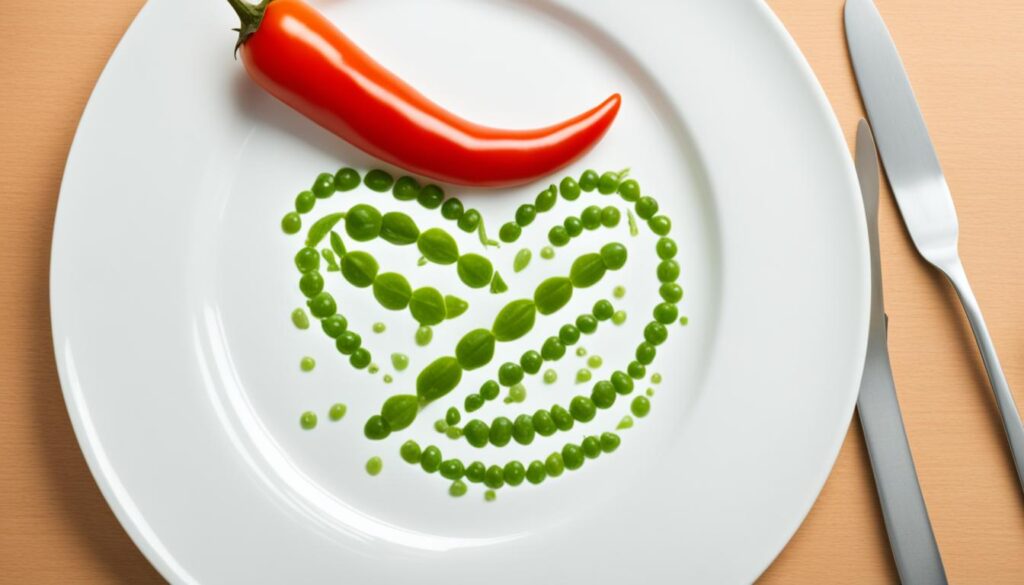
By avoiding these heartburn-triggering foods, you can help manage your acid reflux or GERD. Remember, everyone reacts differently, so watch what you eat and adjust as needed.
Managing GERD through Diet
For people with Gastroesophageal Reflux Disease (GERD), knowing what foods to avoid can really help. By finding out which foods bother you, you can ease your symptoms. This can make your digestion better.
Identifying Personal Triggers
GERD affects everyone differently. The foods that make your symptoms worse might not affect others the same way. Keeping a food diary can help you figure out what to eat to avoid flare-ups.
Watch out for these common triggers:
- Acidic foods, such as citrus fruits, tomatoes, and vinegar-based dressings
- Spicy, fried, or high-fat meals
- Caffeinated beverages like coffee, tea, and soda
- Alcoholic drinks
Your body might react differently to these foods. By paying attention to how you feel after eating, you can find out which foods to cut back on.
| Food Category | Potential Triggers | Heartburn-Friendly Alternatives |
|---|---|---|
| Fruits and Vegetables | Citrus fruits, tomatoes, onions, garlic | Bananas, melons, green beans, carrots |
| Dairy | Whole milk, ice cream, cream sauces | Low-fat or non-fat dairy products |
| Grains | Fried or fatty baked goods | Whole grains, oats, brown rice |
| Beverages | Coffee, tea, soda, alcohol | Water, herbal tea, non-citrus juices |
By eating foods that are good for GERD and avoiding your specific triggers, you can help manage your condition. This can make you feel better.
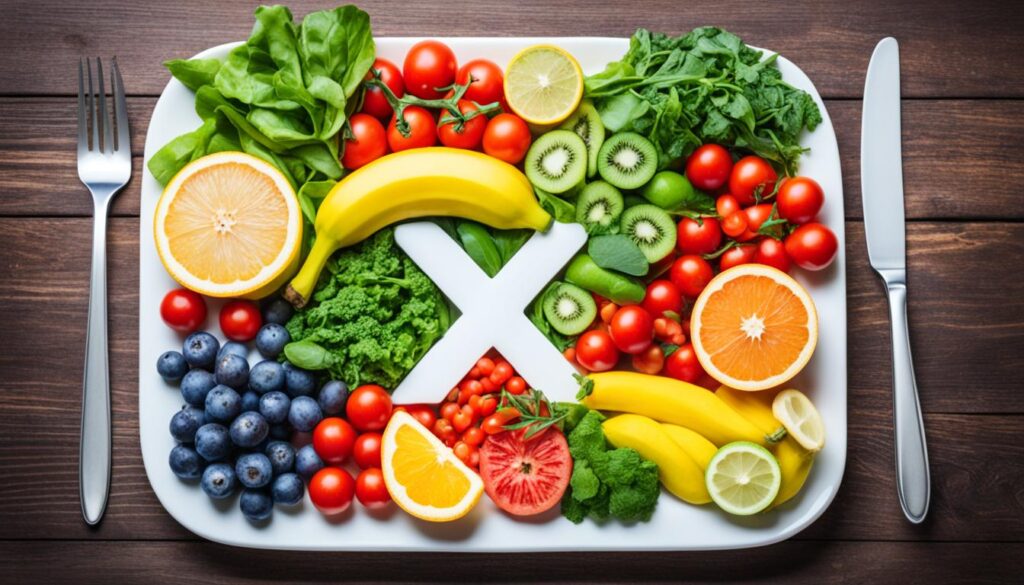
Incorporating Heartburn-Friendly Foods
Avoiding foods that trigger heartburn is key, but adding foods that help can also ease the pain. These foods are packed with nutrients and can balance out stomach acid. They make digestion smoother.
Alkaline-Rich Options
Managing heartburn means eating more alkaline foods. These foods help balance your body’s pH levels. This can cut down on acid reflux.
- Leafy greens: Spinach, kale, and arugula are excellent choices as they are low in acidity and high in alkalinity.
- Vegetables: Broccoli, carrots, and cucumber are all heartburn-friendly options that can soothe the digestive tract.
- Fruits: Bananas, melons, and avocados are alkaline-rich fruits that can provide relief from acid reflux.
- Nuts and seeds: Almonds, cashews, and chia seeds are great sources of healthy fats and alkaline minerals.
Adding these foods to your meals can really help with acid reflux. They also boost your overall health.
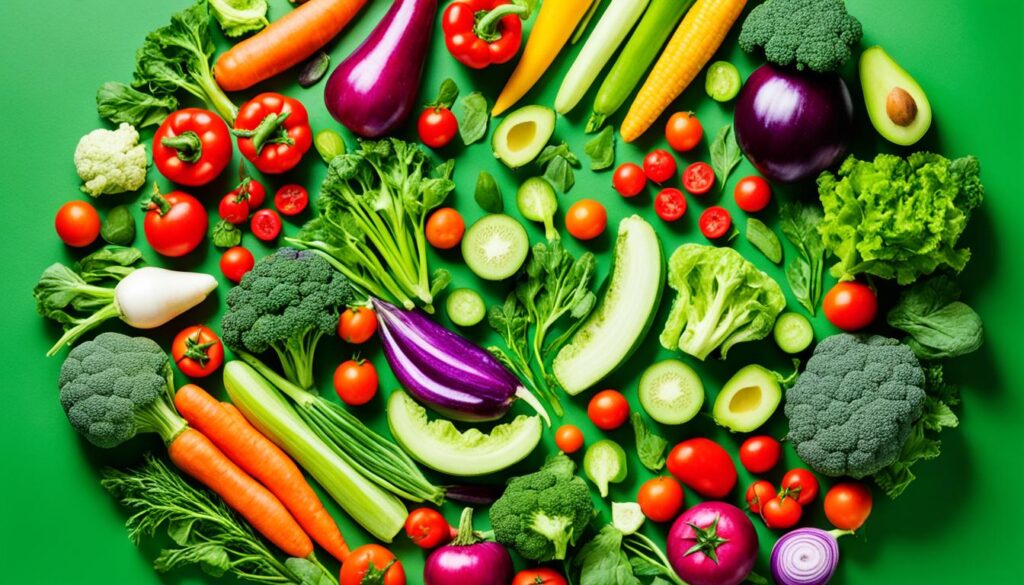
| Food | Alkalinity | Benefits for Heartburn |
|---|---|---|
| Spinach | High | Reduces stomach acid production and soothes esophageal irritation |
| Bananas | High | Coats the esophageal lining and helps neutralize stomach acid |
| Almonds | Moderate | Provides healthy fats and minerals that support digestive health |
| Broccoli | High | Rich in fiber and antioxidants that can reduce inflammation |
“Incorporating heartburn-friendly, alkaline-rich foods into your diet can be a game-changer in managing your acid reflux symptoms and promoting overall digestive health.”
Lifestyle Changes for Heartburn Relief
Managing heartburn and acid reflux is more than just about your diet. Making key lifestyle changes can greatly help with GERD management and give you lasting relief. Here are some easy steps you can add to your daily life.
One great way to fight heartburn is through weight management. Carrying extra weight puts pressure on your stomach, making acid reflux worse. Keeping a healthy weight with a balanced diet and exercise helps ease the strain on your stomach and reduces heartburn.
Managing stress is also key to feeling better. Stress can make GERD symptoms worse by messing with your digestion. Using stress-reducing activities like meditation, yoga, or deep breathing can help control stress and ease heartburn.
Other lifestyle changes that help with heartburn include:
- Avoiding late-night meals or snacking close to bedtime
- Elevating the head of your bed to promote gravity-assisted digestion
- Quitting smoking and limiting alcohol consumption
- Engaging in regular physical activity to support overall digestive health
By making these changes, you can manage your heartburn and GERD better for the long term. This leads to better digestion and overall health.
“The key to heartburn relief is not just what you eat, but how you live.”
Natural Remedies and Supplements
Looking for ways to ease heartburn? Consider natural remedies and supplements. These options can help along with a diet and lifestyle change. They offer a complete way to manage reflux symptoms.
Herbal and Dietary Aids
Ginger is a top choice for reflux relief. It’s been used for years to ease digestive problems, like heartburn. Ginger can lessen stomach acid and ease pain.
Aloe vera is another herbal remedy that helps. Its juice soothes the esophagus, reducing the burning from acid reflux.
Dietary supplements like DGL and slippery elm can also help with GERD. DGL helps protect the stomach lining. Slippery elm soothes and heals irritated tissues.
| Natural Remedy | Potential Benefits |
|---|---|
| Ginger | Reduces stomach acid production, eases discomfort |
| Aloe Vera Juice | Coats and soothes the esophageal lining |
| Deglycyrrhizinated Licorice (DGL) | Strengthens the protective mucus barrier in the stomach |
| Slippery Elm | Soothes irritated tissues, promotes healing |
Remember, while natural remedies and supplements can help some people, talk to a healthcare pro first. This is especially true if you’re on other meds or have health issues.
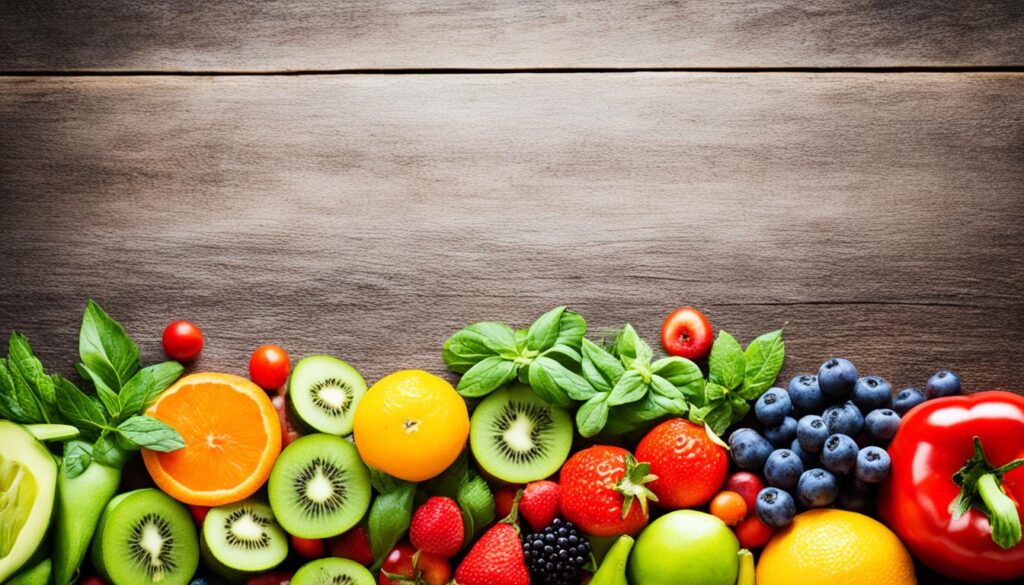
When to Seek Medical Attention
Dietary and lifestyle changes can help manage heartburn and acid reflux. But, knowing when to get medical attention is key. If you have ongoing or severe heartburn, seeing a healthcare professional is a good idea.
Having lots of heartburn or really bad episodes might mean you have a serious issue. This could be GERD (Gastroesophageal Reflux Disease). If not treated, GERD can even cause esophageal cancer. In these cases, doctors might suggest proton pump inhibitors or other treatments to help manage your symptoms and stop further harm.
Watch out for these signs that mean you should see a doctor:
- Persistent heartburn that doesn’t go away after two weeks
- Difficulty swallowing or pain when swallowing
- Unexplained weight loss or not wanting to eat
- Vomiting, especially if it has blood or looks like coffee grounds
- Chest pain or discomfort that antacids don’t help with
If you notice any of these symptoms, get medical attention right away. Doctors can do tests like endoscopy or pH monitoring to find out what’s causing your symptoms. Then, they can make a treatment plan for you.

While heartburn and acid reflux can be managed with diet and lifestyle changes, sometimes you need a doctor’s help. Getting medical care early can fix the real cause of your symptoms. This helps prevent serious problems and keeps your digestive health good in the long run.
Heartburn Relief: Prevention and Management
Living a heartburn-free life means making smart choices. By eating right and changing your lifestyle, you can feel better for a long time. This approach helps you avoid the pain of acid reflux.
Balancing Diet and Lifestyle
It’s key to eat well and make lifestyle changes to fight heartburn. A diet that’s good for heartburn and healthy habits can help you feel better. This way, you can manage acid reflux symptoms for good.
First, figure out what foods make you feel bad. Stay away from things like spicy foods, fatty foods, and too much caffeine and alcohol. Eat more fruits, veggies, and whole grains. These foods help balance your stomach acid and ease digestion.
- Eat a balanced diet with lots of different foods that are good for you.
- Don’t eat too much at once to avoid making heartburn worse.
- Stay active to keep your digestion and weight in check.
- Get 7-9 hours of sleep every night for better health.
- Use stress-reducing activities like meditation to help you relax.
Using these tips can help you manage heartburn better. You’ll feel more comfortable and won’t worry as much.
“Preventing and managing heartburn is a journey, not a one-time fix. Embracing a balanced, heartburn-friendly lifestyle is the key to finding lasting relief.”
Conclusion
Finding relief from heartburn means tackling it from many angles. We need to look at the main causes of acid reflux and GERD. By knowing which foods and drinks to avoid, like acidic, fatty, and spicy ones, we can help our digestion.
Eating foods that are good for heartburn can also help. These foods are alkaline-rich and can ease discomfort. Adding these to our diet, along with lifestyle changes, can make a big difference. This includes keeping a healthy weight, reducing stress, and sitting up straight.
Some people might also use natural remedies or supplements for extra help. But, it’s important to talk to doctors if symptoms don’t get better or get worse. With the right approach to prevention and treatment, we can take back control of our digestive health. This leads to lasting relief from heartburn.

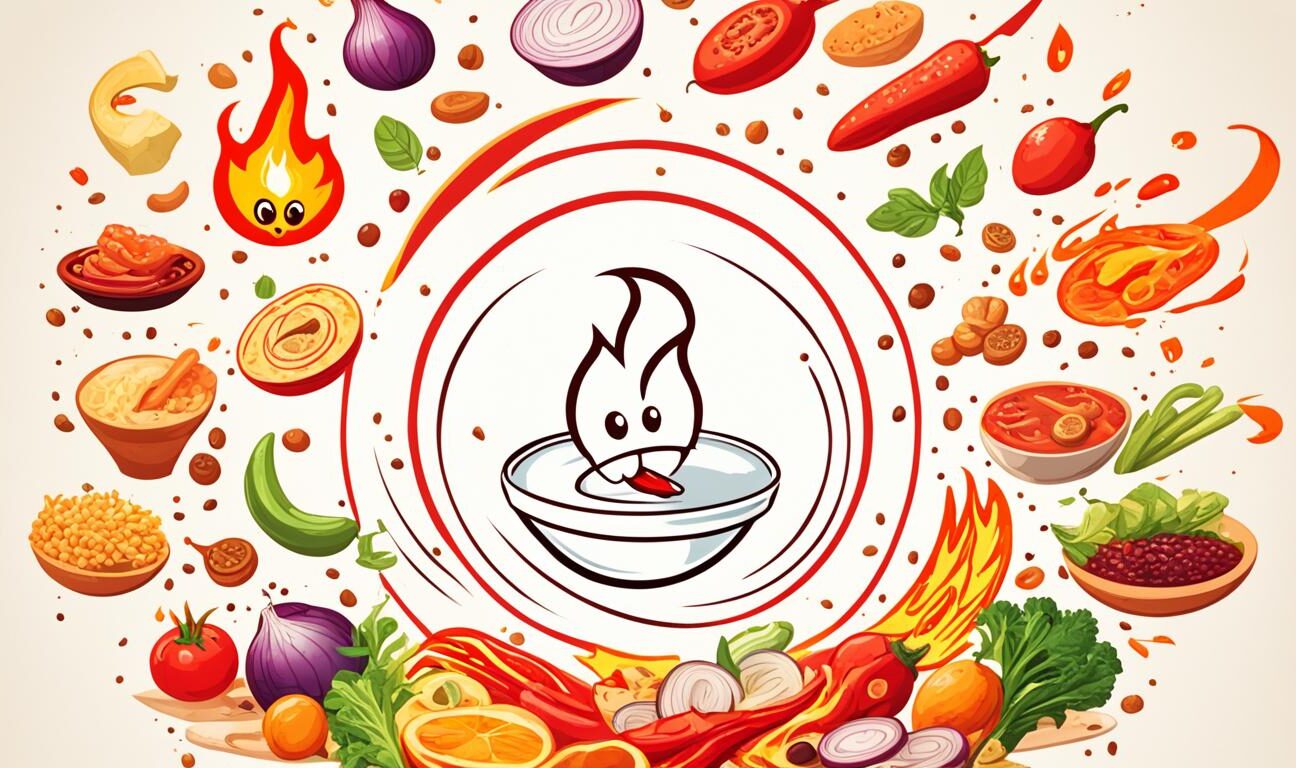





Leave feedback about this